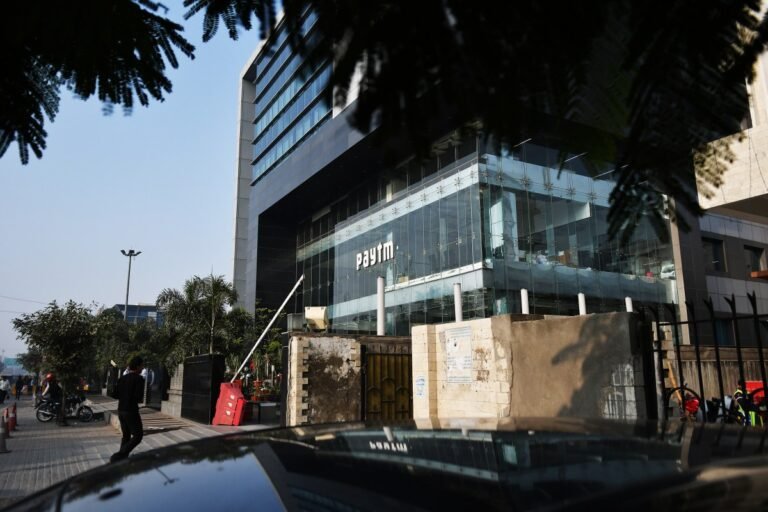Paytm on Thursday said it will stop working with affiliate Paytm Payments Bank and accelerate plans to work with other banks after India’s central bank barred Paytm Payments Bank from nearly all of its business over regulatory concerns.
The Noida-based financial services firm said it expects loan distribution, insurance distribution and stock broking to be unaffected by the Reserve Bank of India (RBI) directive as these businesses have no connection with Paytm Payments Bank. The payments bank hosts 330 million wallet accounts and 30 million bank accounts.
Shares of Paytm plunged 20% within minutes of market opening on Thursday, hitting the circuit breaker.
The RBI on Wednesday issued strict new restrictions on Paytm Payments Bank, which processes transactions for Paytm, effectively shutting down the bank’s operations by preventing it from providing many banking services, including accepting new deposits and enabling credit transactions. It also asked Paytm and Paytm Payments Bank to terminate their hub accounts. Paytm said it will transfer its hub division to other banks.
“The Paytm Payment Gateway (online merchants) business will continue to offer payment solutions to its existing merchants. OCL’s [Paytm’s] Merchant offline payment network offerings like Paytm QR, Paytm Soundbox, Paytm Card Machine, will continue as usual where new offline merchants can also be onboarded,” Paytm said in a stock exchange filing.
Paytm said it expects $36 million to $60 million to be wiped off its annual EBITDA going forward in a “worst-case scenario”. He said the next phase is to continue expanding payments and financial services, “only in partnerships with other banks.”
Some analysts and other industry executives warned that Paytm’s path to getting banks to work with it may not be that easy. “Should lenders have been more cautious in their engagements with Paytm post RBI action on PPBL, coupled with the recently announced reduction in small ticket loans, we estimate a 40-45% negative revenue impact on Paytm, implied value per share Rs 450, or a 41% decline from the current share price,” Goldman Sachs analysts wrote in a note on Thursday.
One97 Communications, the parent company of Paytm, holds a 49% stake in Payment Payments Bank, while the remaining equity is held by Paytm founder Vijay Shekhar Sharma. A payments bank license allows the holder to offer a number of banking services, although there are some restrictions. RBI gave final payments bank approval to Paytm in early 2017.
Wednesday’s crackdown follows the RBI’s order ordering Paytm Payments Bank to stop accepting new customers in 2022, a restriction it still maintains. The RBI said an audit found “persistent” non-compliance and “ongoing material supervisory concerns” warranting further action.
“We have seen RBI taking about 15 months to lift its ban on digital business activities of the largest private sector bank. However, in this case since the first ban (in March 2022) on entry of new customers (about 22 months have passed), RBI has conducted a comprehensive IT audit and has continued to find non-compliance, which in our view indicates that these gaps are quite material,” Macquarie analysts wrote in a note.
“Therefore, we do not see any short-term solution to these problems and this effectively means, in our view, that the RBI is indirectly revoking Paytm’s PPI (prepaid instrument) licence.”
Goldman Sachs analysts added: “Our key concern, unlike previous guidance, is that the RBI has so far not commented on possible steps towards a solution, suggesting to us that the guidance could remain in place for the near future”.
Jefferies said in a note on Thursday that the RBI’s order may have an immediate impact of 20-30% on Ebitda and “reputational impact on lending partnerships may further impact by 20-25%.” This leads us to cut FY25-26 Ebitda by 45%, which will also drag on profitability.”
